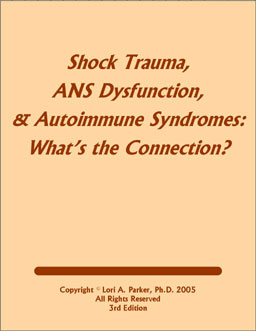You owe it to yourself to invest $14.00 for this eBook.
You have little to lose, and everything to gain.
 |
According to Dr. Noel Rose, professor of Molecular Microbiology and Immunology at John Hopkins University and a pioneer in autoimmune research, "autoimmune disease is now the third major category of illness in the United States and many industrialized countries," just slightly behind heart disease and cancer. There are currently an estimated 8.5 million people in the United States alone who suffer from autoimmune conditions. That is 1 in every 31 people. According to the National Women's Health Center, autoimmune conditions are the fourth largest cause of disability among women in America.
And yet, little is known about what causes the immune system to go awry in this manner - to attack its host. Medical professionals who treat those with autoimmune syndromes might know what the patient's body is doing... they just don't understand why it is happening.
Statements such as the following are common:
- "The reasons why immune systems become dysfunctional in this way are not well understood."
- "The cause and development of this process is still unclear."
- "The cause of autoimmune diseases is unknown."
- "Almost all autoimmune diseases appear without warning or apparent cause."
If you look at the research on specific autoimmune disorders, you will find similar statements:
- "The cause of Sjögren's Syndrome has not been clearly defined."
- "The cause of rheumatoid arthritis is not fully understood."
- "The cause of scleroderma is largely unknown."
- "Doctors and researchers know quite a bit about the changes in the bodies of lupus patients, but the cause is a mystery."
- "What causes Guillain-Barre Syndrome is not known."
- "Doctors and researchers don't understand what causes the autoimmune reaction in multiple sclerosis."
There is good reason why researchers remain baffled. When one attempts to uncover the "first domino" in the development of an AI disease, one finds more of a multidimensional spider web than a linear pathway. This multidimensional spider web makes it difficult to discern a clear-cut cause and effect relationship.
Nonetheless, Dr. Peter Levine, who holds a doctorate in medical biophysics, thinks he has discovered a key component that is seldom, if ever, mentioned. According to Dr. Levine, "What a great majority, if not all, 'syndromal' clients have in common is a functional disorder in how the autonomic nervous system is responding to stress." What Dr. Levine argues, in short, is that the stress control mechanism in the brains of those diagnosed with syndromes is, quite likely, not functioning properly.
A syndrome, as defined here, is a collection of symptoms that occur with some regularity. Examples include not only autoimmune syndromes, but also chronic pain syndromes in general (e.g., Tension Myositis Syndrome and Fibromyalgia), endocrine problems, migraines, anxiety/panic attacks, gastrointestinal disorders, respiratory problems (including asthma), and environmental sensitivities.
In this eBook, Dr. Parker explains clearly and concisely how and why a malfunctioning Autonomic Nervous System is likely a key component (if not the key component) in the development of autoimmune conditions. She not only explains the "how" and the "why", but also gives concrete, specific suggestions on what to do about it.
This monograph is intended primarily for: 1) those with autoimmune conditions; 2) laypeople who desire a deeper understanding of the relationship between stress and disease; 3) health care practitioners who treat autoimmune conditions; 4) health care practitioners interested in the physiology of stress-related conditions.
The Contents
- 77 pages
- Simple charts, diagrams, and graphs
- Detailed endnotes (for those seeking greater detail and explanation)
- References
| Content includes: |
||
| Introduction Autoimmunity and Autoimmune Disease The Genetic Factor and Autoimmune Disease A Brief Overview of the Autonomic Nervous System The Emergency Stress Response The Endocrine Response to an Emergency Situation |
The Accumulation of Stress Unresolved Stress Tuning of the ANS Stages of Adrenal Exhaustion Shock Trauma is Physiological: It's about Energy . . . A Case in Point Conclusions and Implications Appendices A-F |
|